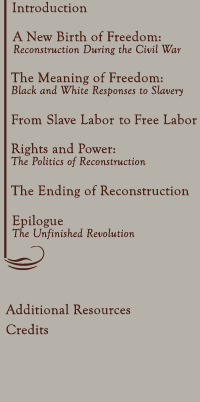








Introduction
The most difficult task confronting many Southerners during Reconstruction was devising a new system of labor to replace the shattered world of slavery. The economic lives of planters, former slaves, and nonslaveholding whites, were transformed after the Civil War.
Planters found it hard to adjust to the end of slavery. Accustomed to absolute control over their labor force, many sought to restore the old discipline, only to meet determined opposition from the freedpeople, who equated freedom with economic autonomy.
Copyright
2003